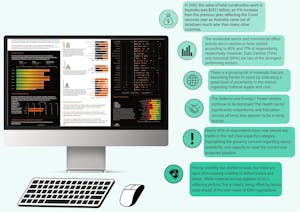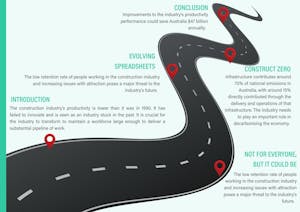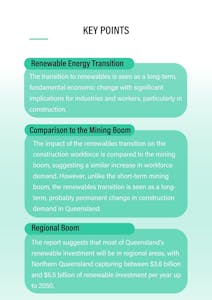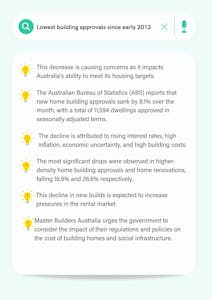In writing this article I am reminded that we live in a time where detailed industry reports and statistics are released frequently for Australia’s construction industry. For me, commonly this amounts to a mind-blowing barrage of information that I am not able to easily digest.
I am of the view that taking on board any ‘at a point of time statistics’ and thinking you have a good and solid insight into industry trends is a great mistake. I, myself, have also fallen for the trap of reading reports that have incorporated into trusted statistics and thinking I have a good appreciation of future industry challenges and risks.
Turns out that on occasions this was not the case.
Why is this the case?
The industry is changing so rapidly, and it is so dynamic and innovative (like green shoots), that I think that we need new measures to gauge the health or otherwise of the industry.
Anyway, that is a discussion for another day.
Returning to the reality of having to deal with the current set of reports or statistics and how to present them to readers for information and learning – I have decided to throw the rule book out and try something new.
In this article, I will present sourced material for readers to learn and appreciate different industry outlooks and perspectives. Rather than try and persuade readers, through my analysis of all these reports or statistics and trends, that this is the current state of the industry and here are some projections.
I hope people read this information with an open mind, think about issues as they may impact them and consider if they should change or confirm ways of doing business.
That is all, just think about their business in the context of what they have read.
Leading sources for Australia’s construction industry
The organisations I have selected to gather and present their published information, I believe are reputable and trusted, namely:
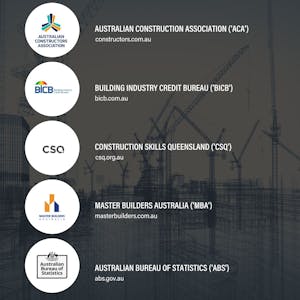
(ACA), (BICB), (CSQ), (MBA) and (ABS).
All that aside, there is another reality when it comes to how people view information or statistics.
Are we a half-glass full or half-glass empty person?
Industry issues through different prisms
ACA views
The “2023 Construction Market Sentiment Survey” report conducted by Arcadis and the ACA outlines issues that are now impacting and challenging the construction market. Here are some key points:
Another ACA report “Disrupt or die: transforming Australia’s construction industry” dated November 2022 discusses the need for transformation in Australia’s construction industry. Here are the key points:
BICB views
The article titled “Builder Collapse Avalanche Picking Up Speed” dated 14 April 2023 discusses the increasing rate of insolvencies in Australia’s construction industry:
CSQ views
A publication titled “Industry Outlook 2022-2023” is an outlook for Queensland’s construction industry. Here are the key points:
- Despite the high demand for talent, employers are struggling to find enough workers.
- The document mentions that projects are expected to take longer and cost more until most of 2023.
- CSQ plans to continue supporting the training, upskilling, and reskilling of workers during these changeable times. Also, they will be increasing activities to attract new industry entrants.
- The 2022-23 CSQ Training Plan outlines a $51M training and workforce investment to boost the capability and agility of Queensland’s building and construction industry.
Another CSQ document titled “Queensland’s Renewable Future: Investment, jobs and skills“, dated August 2022, is a study that explores the implications of Queensland’s renewable energy transition for the construction industry and its workforce. Here are the key points:
MBA views
A recent media release from the MBA discusses the significant drop in building approvals in Australia, reaching their lowest levels since April 2012.
ABS views
A recent release from the ABS provides preliminary estimates of value of total construction work done, building work done and engineering construction work done. I love this data, but I do not take the information as anything more than early potential trends, with extensive qualifications, namely:
“This publication provides an early indication of trends in building and engineering construction activity. The data are preliminary estimates with a response rate of approximately 70% of surveyed construction entities during the quarter.
This is lower than the average response rate due to difficulties collecting data as a result of the COVID-19 pandemic.
This places the data at increased risk of revision when results are updated in Engineering Construction Activity, Australia on 28 June 2023 and in Building Activity, Australia on 12 July 2023.
Mining projects tend to be complex in structure and comprise a number of different investment activities”
… and so on and so forth.
However, I would encourage readers to read in full all the qualifications at the bottom of the release.
Regardless of these disclosed qualifications, I take my hat to the ABS for publishing data of this nature.
I will highlight key statistics, namely:
“In seasonally adjusted terms in the March quarter:
- Total construction work done rose 1.8% to $57,686.5m
- Building work done fell 1.1% to $30,620.7m
- Engineering work done rose 5.3% to $27,065.8m
The trend estimate for total construction work done rose 1.9%.”
I would encourage readers to fully explore this excellent government website.
Final thoughts
What a mixed bag of opportunities and challenges!!
I hope readers have found this article informative. I always welcome feedback.
Not intended as legal advice. Read full disclaimer.


